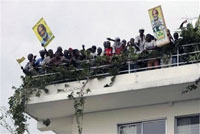In occupied Haiti
Masses in street set election victory
By
John Catalinotto
Published Feb 23, 2006 12:13 AM
Residents of Cité Soleil and other
poor neighborhoods of Haiti took to the streets last week to prevent the Haitian
bourgeoisie and U.S. imperialists from stealing the presidential election of
Feb. 7.
|
Protesters take over upscale Hotel Montana
where U.S.-imposed election officials were
preparing to announce final results Feb. 13.
|
After a week of mass demonstrations, Haiti’s election
commission on Feb. 16 reversed an earlier decision and declared that René
Préval had won the election in the first round by getting more than 50
percent of the vote.
Préval, a businessperson who used to run a
bakery in Port-au-Prince, was trained as an agronomist in Belgium. He was
President Jean-Bertrand Aristide’s prime minister in his first government
in 1990-1991, followed him into exile and then was president from 1996-2001
after Aristide’s first term. Aristide was again elected by a landslide
before being overthrown once more by a U.S.-orchestrated coup on Feb. 29,
2004.
Whatever Préval’s intentions are or his ability to
carry them out, he is perceived as an ally of Aristide, and many of the people
who voted for him hope he will find a way to have Aristide return to
Haiti.
|
Port-au-Prince, Haiti Feb 11. Thousands
marched from Cité Soleil.
|
According to the South African news agency SABC, on Feb. 21
Aristide said “he will return to his country once Rene Préval, the
newly elected president, has made an assessment of the political situation
there. The assessment will be done in consultation with the United Nations,
South Africa, CariCom and the African Union.”
Meanwhile, the head of
Haiti’s official election commission, Jacques Bernard, has left the
country, claiming to fear for his life. Bernard had earlier announced that
Préval got less than 49 percent of the vote before the commission was
forced to reverse itself.
The entire election was stacked against
Haiti’s poor people, who are among the poorest in the Western Hemisphere.
Voting booths were rare in the poor neighborhoods in both the cities and
countryside. They were ample in the wealthier districts. But even with an
election under occupation that required long walks and long waits to vote,
Haitians came to the polls.
Election fraud revealed
Early
returns had showed Préval with over 60 percent of the vote. His nearest
rival had less than 12 percent. The population exploded when the commission then
announced that Préval’s total had dropped to 48.86 percent and that
a second round would be necessary.
The announcement itself accidentally
exposed the fraud: a graph illustrating vote percentages showed Préval
with 52 percent at the same time that the speaker claimed Préval’s
total was less than 49 percent.
The suspicion of fraud grew to certainty
after it was discovered that some 147,000 ballots were discarded for allegedly
being invalid and hundreds of thousands of apparently valid ballots were found
buried in a lot. Another 85,000 ballots were blank: when these 85,000 were
removed from the total vote, this placed Préval’s percentage over
50 and it allowed the commission to declare him a winner without admitting vote
fraud.
But this happened only after a week of massive demonstrations, one
numbering 100,000 in Port-au-Prince, Haiti’s capital, and clashes with the
United Nations occupation troops known as MINUSTAH.
The object of the
fraud was to throw the election into a second round. In that round, all the
rightist and openly pro-U.S. candidates were to join behind Leslie Manigat, who
had come in a distant second. Another election fraud would then be carried
out.
The Bush administration tried to prevent a Préval victory.
Former U.S. Assis tant Secre tary of State for the Western Hemisphere Roger
Noriega, a key player behind the 2004 coup, wrote in the Miami Herald Feb. 16
that “violent mobs” of Préval supporters were “trying
to convince those tallying the ballots that 49 percent is ‘good
enough’.” Noriega set up Haitian death-squad leaders in 2004 to
murder their way throughout Haiti and drive Aristide from office —with the
help of U.S. Marines.
The Haitian experience showed that even in an
occupied country in a rigged election it is possible for the masses to vote
someone they want into office—but only if they are ready to come out into
the streets to back up the electoral victory.
Articles copyright 1995-2012 Workers World.
Verbatim copying and distribution of this entire article is permitted in any medium without royalty provided this notice is preserved.
Workers World, 55 W. 17 St., NY, NY 10011
Email:
[email protected]
Subscribe
[email protected]
Support independent news
DONATE


